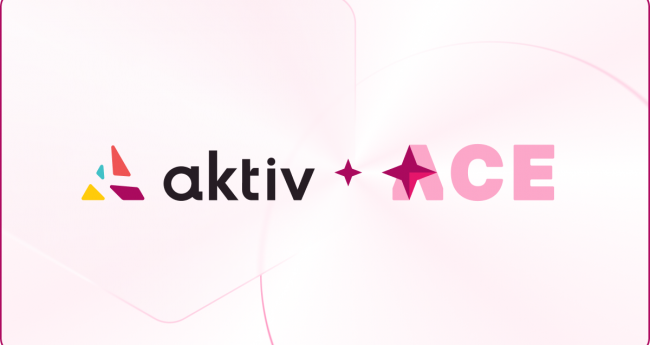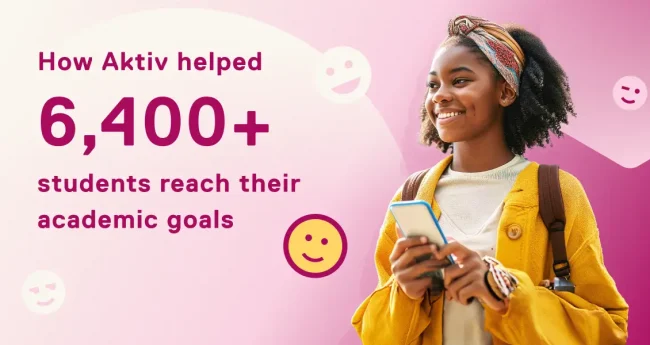Aktiv Learning (Chem101)'s story is now on the Edtech Insiders Podcast! 🎙
Hosts Ben Kornell and Alex Sarlin invite Justin Weinberg to talk about his founder journey, 101edu’s rebrand to Aktiv Learning, and approach to building next-generation learning experiences for STEM students.
Meet the Hosts

Alex Sarlin
Co-founder & Host at Edtech Insiders

Ben Kornell
Co-founder & Host at Edtech Insiders
Special Guest

Justin Weinberg, PhD
Co-founder & CEO at Aktiv Learning
Ben Kornell
First up we have Justin Weinberg. He’s the CEO of Aktiv Learning, formerly 101 Edu. We’re excited to talk to Justin today a little bit about his founder’s journey, the state of higher ed and higher ed content, mobile development, and what’s next for innovation in higher ed. Welcome, Justin.
Justin Weinberg
Thanks a lot for having me. It’s great to be here.
Ben Kornell
Great. So a lot of our audience are founders themselves, or EdTech-curious, as we call it. They’re thinking about a new venture getting started. Why don’t you start us off with a little bit of your journey to get Aktiv Learning off the ground?
Justin Weinberg
Yeah, absolutely. So throughout my career, I’ve been a scientist, I’ve been an educator, and I’ve always just been in love with how technology can really make a difference in people’s lives. So 101Edu for me – now Aktiv Learning – is really the intersection of all those things. Things for me and edtech really got started back in 2010 when I was in college, doing tutoring pretty regularly. And I ended up teaming up with my current co founder (Igor Belyayev) to create this hobby app for delivering chemistry video lessons on a smartphone to students. And you have to remember this is 2010 and video lessons in education at that time were barely a thing, but our theory was that smartphones were exploding and were clearly the future of where things were going for many industries. We thought, hey, wouldn’t it be cool and effective if we could use an app as a delivery mechanism for students to get and watch these videos right on their phone? And we turned out to be right. We put this app out and all of a sudden we got over 500,000 downloads on it and we didn’t promote it or market it or anything. People just really loved it.
This told us two big things: One, just the order of magnitude, of the number of students that were struggling in STEM who needed help. And the second thing was that they were really looking at their phone as a way to learn.
And that got me obsessed with thinking about how I could take what we built to the next level. I knew, as an educator and someone who had been in front of a lot of students, that next level had to be around active learning. Because when you’re talking about STEM disciplines – whether you’re talking about chemistry or physics or math or engineering – it’s really about students sitting down and solving problems and struggling and iterating through that process. Video Lessons are definitely nice. They definitely have a place, but ultimately it’s passive. You know, you’re watching someone show you how to do something.
Fast forward a few years, I decided to pursue my PhD in Chemical Engineering at Carnegie Mellon. I’m doing that and I’m still thinking about this active learning problem, this ed tech problem, and how we can solve it. Being around academia even more, I started to realize that a lot of the problems that existed were not just students on their own struggling. It was really about what was occurring in the classroom. Because unfortunately, even today, we still have many college classrooms that are essentially students coming into a lecture hall and sitting or listening for 60 to 90 minutes straight.
We started to think about this active learning problem not only as a way to help students when they’re struggling, but also as a transformed college learning experience. One day, I had this idea for how we could tackle the problem with the part of chemistry that deals with drawing and visualizing molecular structures. So I got really excited. I ended up calling Igor, my current co-founder. I said, ‘I have this awesome idea, we have to go build it.’ And that’s essentially how we got started with Aktiv.
Ben Kornell
Super interesting that you’re a PhD candidate, at Carnegie Mellon, a hotbed of ed tech innovation. I love both that you’re leaning forward on mobile, but also on this concept of active learning… It sounds like you kind of got your roots in a b2c channel. But when did you flip over to selling to schools or is that how your model works? You sell to schools?
Justin Weinberg
Yes. So what we do is we partner with the professor or the instructor who teaches the course and we become part of their syllabus. We become one of their required course materials. A lot of times that is in replacement of publisher options and publisher technology that they’re currently using. We come in to give a more affordable, but also more engaging and more active, experience for the students. So it’s sort of like B to B to C if you’re gonna use those acronyms.
Ben Kornell
Fascinating.
Alex Sarlin
Just listening to your origin story of how you came up with the idea for 101 and now Aktiv, it reminds me, it’s sort of a really common – in a good way – EdTech origin story. Which is that somebody puts something out in the world, and they’re just shocked at how many people need and want it. That was Khan’s story. That was the story behind all the MOOC platforms…I wanted to ask about the fact that you are a chemical engineering PhD, your head of content is also a PhD in chemical engineering. And I think one thing I’m curious about is how you translate. You are very sophisticated academics in that space, but you’re teaching at an introductory level. How do you think about making sure that your students can understand that you’re getting over that expert blind spot and teaching at the level that they are at especially because they are often in high school?
Justin Weinberg
Well, a lot of times it’s really thinking about and remembering what it was to be like a student and be learning something for the first time. A lot of times we are coming in to replace some sort of publisher technology that’s attached to a textbook. And these sorts of technologies have come into play over years as a result of PhDs and subject matter experts putting that together. But when you look at the experience that they create, for example, like having students draw a molecular structure online or enter a specific answer or come up with a chemical equation that asked about math concepts as well, but the interface that students are sort of presented with actually does more to hinder their learning process than it does to actually aid them.
So we really think about technology as a way to lower the barrier, not increase it. We don’t just have meetings talking about concepts and chemistry. It’s really about how do you effectively use design, combined with pedagogy, to really make something intuitive to a student so the technology is getting out of their way and it’s helping them learn. It’s adding to the experience rather than getting them distracted. That’s a big part of what we do.
Alex Sarlin
I think it’s terrific. Just a quick follow up there because I love how you’re thinking about it. When I look at what Aktiv is doing, there are a few things in there that feel super, super modern. The focus on student affordability, the mobile first approach.. I wanted to ask about your rebranding. You recently changed the name of the company from 101Edu to Aktiv Learning and changed the Chem101 product to Aktiv Chemistry. Tell us a little bit about that change and what you’re hoping to achieve with it.
Justin Weinberg
Yeah, so a great question. When we started the company and founded it as 101 Edu,the term 101 wasn’t actually a reference to the Intro 101 courses. It was actually a reference to how we as a society used the term 101 as a way to make something more accessible to students. And that’s how we really thought about what we were doing. How we were taking these arcane, mostly difficult types of subject matter and bringing it down to where the students are. So that was the emphasis around the original name.
Over time, we did find out that people were confusing that with the college course code, and we had intentions of going beyond the first year level. For example, last year we expanded our platform into organic chemistry, which is the second year level of chemistry. And certainly as we discussed, the whole company is centered around a deep philosophy of active learning. So we really wanted to bring that into our name. And we decided to coincide that with our expansion from chemistry into math, which is our new product and discipline. So we decided to do it all at once. So the company’s now Aktiv Learning, we renamed Chem101 to Aktiv Chemistry, and just launched a new product called Aktiv Mathematics.
Ben Kornell
Well, I have a lot of empathy. I’ve rebranded four different times in my career, and it’s a pain point, not just technically to get all the branding right, but also to get all your customers and get the team and everyone just to reassociate with that new name. I also feel like this is another part of why we had you on. There’s elements of your founder journey that just so resonate with what we hear from people outside: going from a chemistry vertical to then being multidisciplinary. It’s a common challenge people are trying to tackle. How has that been going? What has been the biggest challenges and where are you seeing synergy and opportunity, and where are you hitting roadblocks?
Justin Weinberg
Great topic. Something that we’ve thought about as our strategy since the beginning, and certainly over the past couple years or so, as we laid the plans for going into math. As I think about this, and especially when we started the company, one thing that we were really insistent on not doing was taking the traditional approach to learning platforms in our industry. Oftentimes that’s taking a generic learning platform and then loading content onto it that ranges from the humanities to the STEM disciplines. And what we’ve found time and time again, is that it doesn’t create good user experiences for learners.
And it also doesn’t really allow for any innovation to happen within a discipline because there ends up being no focus. So when we started, we were very committed, and we said, ‘We are going to build and grow the best learning platform for chemistry. And that’s all that we’re going to do.’ And what that allowed us to do is really invest and create some awesome technology from the ground up that solves some of those major teaching and learning challenges that come up in chemistry. We’re talking about things like helping students draw Lewis structures and practice nomenclature and write out and build chemical formulas and reactions and equations. Dimensional Analysis is another big one. Equilibrium calculations…
But while we were doing this, we also learned how to build a learning platform with an instructor dashboard. And integrate that into the institution’s LMS like Canvas or Blackboard, we learned how to sell and market a platform like this to instructors. And we also learned a lot about how to support those adoptions and what the best practices were. And the great thing about all those things I just mentioned is that they carry over directly when you go to another discipline.
So when it was time to do math, we already had a lot of the pieces in play. We could just focus on the new discipline itself. For math specifically, we really wanted to invest in some new technologies that were, again, going to solve the teaching and learning challenges of that discipline. With Aktiv Mathematics, which we just announced a few weeks ago, two of the major things we wanted to solve were students’ foundational math skills as they go through college courses. We talked to a ton of faculty teaching ranges of courses from developmental math and college algebra and precalculus. And they told us time and time again that it’s not really the problems with what I’m trying to teach them right now. It’s that I’m teaching them something and they don’t know how to do an arithmetic problem or they don’t know how to solve a simple linear equation which are foundational building blocks to the higher order concepts. So that was something we wanted to focus on.
And also, the ability to capture students’ work, as they solve problems, in our platform. Instead of just creating another platform where students get a problem and they put their answer into a box. We really wanted to create some new problem format interfaces, where students could actually put in their steps and get feedback along the way. And all of that has resulted in some new tactile ways for students to play and explore and manipulate these concepts and in a way where you can capture student work and get feedback.
So that’s a little bit about how we’ve approached our journey from one discipline to another. It’s really benefited us to have that focus in the beginning and really go deep into the learning challenges which instructors, at the end of the day, really, really appreciate.
Alex Sarlin
It’s really interesting to hear you discuss that tension that is in some edtech products and I think it’s exactly dead on. It really resonates with my experience and I think many experiences of edtech users and creators: you can either do something that you know technically would work for any subject and upload the content into a sort of blank canvas and LMS, but it doesn’t do any subject particularly well because it’s not designed to think about the problems and issues and affordances of that subject. So that idea of going deep in chemistry then using the pieces of the puzzle that can transfer up to other subjects like the administrator dashboards or the question types or the infrastructure. Super super interesting description. I think that’d be very educational for other ed tech founders.
Ben Kornell
Yeah, I would also just say EdTech funders often push you to have a bigger total addressable market, which would then like steer founders towards the generic universal, ubiquitous, when actually some of the highest value companies of today started with a really narrow vertical. I mean, Newsella is a unicorn and it was doing like middle school social studies. And I think there’s just something to be said for getting your problem-solution really right in something specific, and then build from that core. We’ve got to wrap today. Justin, it’s so great to have you on and it’s just been really exciting to watch the journey and now that you’re active learning, excited to see where you take things.
Justin Weinberg
Thank you so much Ben and Alex, it was great to be here.
About Edtech Insiders:
At Edtech Insiders, we interview founders, investors, operators, educators, and thought leaders about the future of education technology. You’ll hear from leaders across the education technology industry and learn about all of the important edtech trends happening globally.





